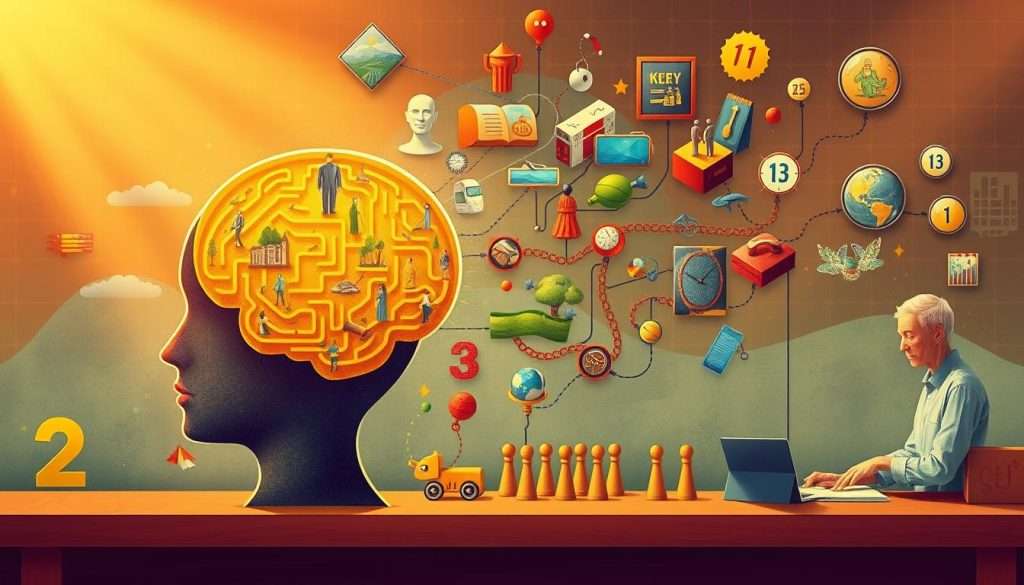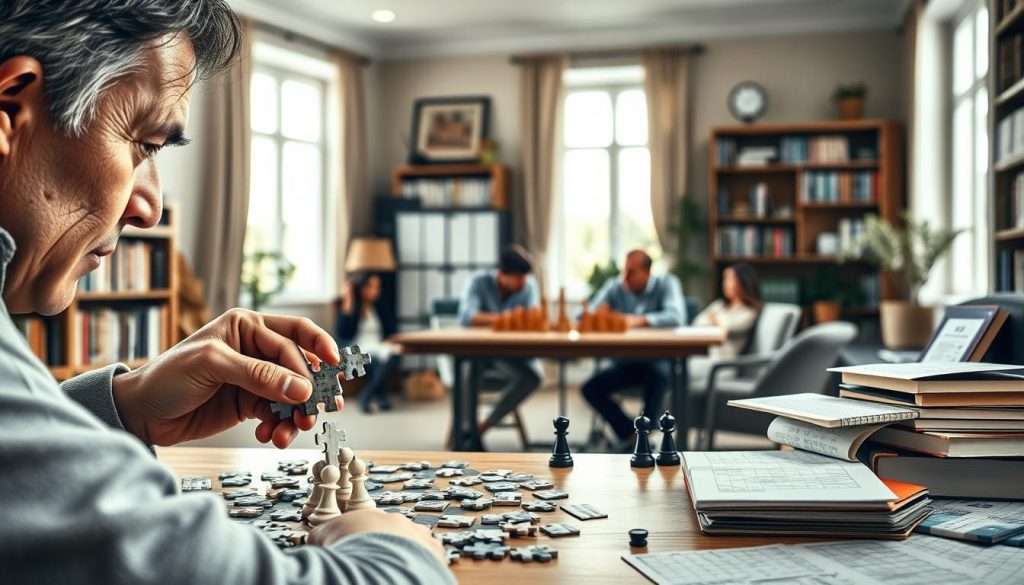Have you ever walked into a room and forgot why you were there? Or struggled to remember a familiar face? You’re not alone! Forgetfulness can be frustrating, but there are ways to improve your memory.
The Mayo Clinic says simple lifestyle changes can help a lot. Being active, staying mentally sharp, and managing health issues can boost your memory. In this article, we’ll look at these strategies and more to help you boost your memory and stay focused.
Key Takeaways
- Simple lifestyle changes can significantly improve memory.
- Being physically and mentally active is crucial.
- Managing chronic health issues is vital for memory.
- Proven strategies will be discussed to help improve memory.
- Effective techniques to boost memory and stay focused.
The Science of Memory: How Your Brain Remembers
To remember better, we first need to understand how our brains process information. Our brains filter and prioritize info, sometimes leading to forgetting. Neuroscientists say our brains use a complex system to encode, store, and retrieve info.
The Three Stages of Memory Formation
Memory formation has three key stages. Knowing these stages helps us see where memory might fail.
Encoding: Getting Information In
Encoding is the first stage where our brains turn info into a format for storage. This involves paying attention and linking new info to what we already know.
Storage: Keeping Information Available
After encoding, info needs to be stored in our memory. This storage can be short-term or long-term, based on how we process and rehearse the info.
Retrieval: Accessing Stored Information
The last stage is retrieval, where we access stored info. Good retrieval depends on how well info was encoded and stored.
Different Types of Memory Systems
Our brains use different memory systems for different types of info.
Short-term vs. Long-term Memory
Info can be stored in short-term memory for immediate use or long-term memory for later recall. Repetition helps move info from short-term to long-term memory.
Procedural vs. Declarative Memory
We have procedural memory for skills and tasks, and declarative memory for facts and knowledge. Knowing these differences helps us tailor our learning strategies.
| Memory Type | Description | Example |
|---|---|---|
| Short-term Memory | Temporary storage for immediate use | Remembering a phone number long enough to dial it |
| Long-term Memory | Permanent storage for later recall | Recalling your first day of school |
| Procedural Memory | Memory for skills and tasks | Riding a bicycle |
| Declarative Memory | Memory for facts and knowledge | Recalling historical dates |
Why We Forget: Common Causes of Memory Lapses
We’ve all forgotten things like where we put our keys or what we were saying. But what causes these memory lapses? Knowing the reasons can help us improve our memory.
Normal Age-Related Memory Changes
As we get older, some memory changes are normal. For example, it might take longer to learn new things or remember familiar words. But, losing a lot of memory is not normal with age.
Lifestyle Factors That Impair Memory
Lifestyle choices can affect our memory. Chronic stress and sleep deprivation are big problems.
Chronic Stress and Cortisol Effects
Stress can raise cortisol levels, harming memory. It damages the hippocampus, key for making memories.
Sleep Deprivation’s Impact on Consolidation
Not getting enough sleep messes with memory consolidation. This is when we move info from short-term to long-term memory. Good sleep is key for keeping memories.
Medical Conditions Affecting Memory Function
Some medical conditions can really hurt memory. For instance, Alzheimer’s disease, diabetes, and thyroid disorders can all affect how well we remember things.
| Condition | Impact on Memory |
|---|---|
| Alzheimer’s Disease | Significant memory loss and cognitive decline |
| Diabetes | Potential for cognitive impairment if not managed properly |
| Thyroid Disorders | Can cause memory problems if thyroid hormone levels are not balanced |
By knowing these factors, we can protect our memory. We can also improve our mental sharpness through brain training.
Stop Forgetting: Powerful Techniques to Retain Information
Improving your memory is simpler than you might think. The right strategies can make a big difference. By using effective recall techniques, we can remember important details better.
Active Attention and Mindful Focus Practices
Improving memory starts with active attention and mindful focus. Stay fully present when learning new things. Avoid distractions and use mindfulness to boost your concentration.
Creating Strong Neural Associations
Linking new info to something familiar is key. This makes it easier to remember. By connecting new info to what we already know, we strengthen our brain’s connections.
Spaced Repetition: The Science of Perfect Timing
Spaced repetition is backed by science. It involves reviewing material at longer intervals to solidify it in our memory.
Optimal Intervals for Review
Finding the right time to review is important. Research shows that short reviews followed by longer gaps can boost retention.
The Forgetting Curve and How to Beat It
The forgetting curve shows how our memory fades over time. Spaced repetition helps us beat this curve, keeping information in our memory longer.
| Technique | Description | Benefits |
|---|---|---|
| Active Attention | Being fully present when learning new information | Improved concentration and retention |
| Spaced Repetition | Reviewing material at increasingly longer intervals | Enhanced long-term memory retention |
| Neural Associations | Linking new information to existing knowledge | Easier recall and improved understanding |
Using these techniques daily can greatly improve our memory. We’ll remember important details better and recall them when needed.
“Repetition is the mother of learning, the father of action, which makes it the architect of accomplishment.”
Mnemonic Strategies That Dramatically Improve Recall
To boost memory and enhance recollection, it’s key to explore effective mnemonic techniques. These strategies are powerful tools that can greatly improve your ability to recall information. By using these techniques, you can change how you learn and remember.
The Memory Palace Technique
The Memory Palace technique, also known as the method of loci, is a strong method for remembering complex information. It involves imagining a familiar place and linking the information you want to remember with specific spots in that place.
Creating Your First Mental Journey
To start with the Memory Palace technique, picture a place you know well, like your home. Imagine walking through it mentally, picking out distinct spots to link with the information you want to remember.
Placing Information Along Your Route
After mapping out your mental journey, place the information you want to recall at specific spots along the way. The more vivid and unusual the associations, the better you’ll remember them.
Acronyms and Acrostics for Sequential Information
Acronyms and acrostics are great mnemonic devices for remembering sequential information. By making a word or phrase from the first letters of the items you need to recall, you can make them easier to remember.
Chunking: Breaking Down Complex Information
Chunking means breaking down complex information into smaller, easier-to-manage chunks. This method is very helpful for remembering numbers, passwords, or lists.
Visualization and Mental Imagery Techniques
Using visualization and mental imagery can also boost memory. By creating vivid mental images that connect with the information you’re trying to remember, you can make it stick better.

By adding these mnemonic strategies to your daily routine, you can greatly improve recollection and boost your memory. Try out different techniques to see what works best for you.
Brain-Boosting Nutrition and Lifestyle Changes
Improving your memory and brain function starts with diet and lifestyle changes. Making smart food choices and living a healthy lifestyle can boost your brainpower. This improves your overall well-being.
Foods That Enhance Cognitive Function
Eating a balanced diet with certain nutrients is key for brain health. Focus on foods rich in omega-3 fatty acids and antioxidants.
Omega-3 Fatty Acids and Brain Health
Omega-3 fatty acids, like EPA and DHA, are vital for brain function. Salmon, walnuts, and chia seeds are great sources.
Antioxidants and Memory Protection
Antioxidants protect the brain from damage. Berries, leafy greens, and other fruits and veggies are full of these good compounds.
Exercise Routines That Strengthen Memory
Exercise is good for both body and brain. Aerobic exercise, in particular, boosts brain function.
Aerobic Exercise and Hippocampal Growth
Aerobic activities like running and swimming help grow the hippocampus. This area is linked to memory.
Optimal Exercise Duration and Frequency
For best brain benefits, do at least 150 minutes of moderate exercise weekly.
Sleep Optimization for Memory Consolidation
Good sleep is crucial for memory. Having a regular sleep schedule boosts brain function.
Stress Reduction Techniques for Cognitive Clarity
Too much stress hurts brain function. Meditation, yoga, and deep breathing can help reduce stress.
By making these nutrition and lifestyle changes, you can greatly improve your memory and brain abilities.
Mental Workouts: Brain Training for Sharper Memory
To keep your brain sharp, it’s key to do mental exercises regularly. Just like our bodies need exercise, our brains need mental stimulation. This helps keep memory and thinking skills sharp.
Cognitive Puzzles and Their Benefits
Cognitive puzzles are great for your brain. They come in many types, like crosswords, Sudoku, and memory games. Each one targets different brain skills.
Crosswords, Sudoku, and Memory Games
Crosswords boost your language skills and memory. Sudoku sharpens your logic and problem-solving. Memory games focus on remembering patterns and objects.

For the best results, do cognitive puzzles often. Even 15-20 minutes a day can help. Sticking to it improves your brain’s function and memory.
Working Memory Training Exercises
Working memory exercises are also great for brainpower. They involve remembering and recalling sequences, like numbers or words in reverse.
Learning New Skills to Build Cognitive Reserve
Learning new things builds cognitive reserve. This reserve helps fight off age-related brain decline. Activities like learning a new language or playing music are very effective.
Languages, Music, and Novel Activities
Learning a new language works your brain’s language centers. Music learning boosts memory and coordination. Trying new things keeps your brain flexible and ready for new info.
Adding these mental exercises to your daily life can greatly enhance your memory and brain function. This keeps your brain sharp and healthy.
Digital Memory Aids: Apps and Tools for Enhanced Recall
In today’s world, we have many tools to help our memory. The Mayo Clinic recommends using calendars and to-do lists. Now, we have even better technology to help us remember.
Spaced Repetition Software Systems
Spaced repetition is a great way to improve memory. It means reviewing material at longer intervals to keep it in your memory. Spaced repetition software makes it easy to use this method.
Anki, SuperMemo, and Other Effective Options
Apps like Anki and SuperMemo are great for spaced repetition. They let you make digital flashcards and set review times. These apps help a lot with remembering things.
Note-Taking and Organization Applications
Good note-taking is key to keeping information. Apps like Evernote and OneNote have features like tagging and searching. They make it easier to find and remember what you’ve written.
Brain Training Programs: What Works and What Doesn’t
Brain training programs aim to boost memory and thinking skills. But, it’s important to be careful. Look for programs that have scientific proof and avoid those that make too big promises.
Using digital memory aids can really help your memory. Whether it’s spaced repetition, better note-taking, or brain training, there’s something for everyone.
Social Learning: Boosting Memory Through Interaction
Social learning plays a big role in improving memory. Talking and learning with others helps us remember better.
Teaching as a Memory Enhancement Strategy
Teaching what we know helps us remember more. It makes us organize our thoughts and simplify complex ideas. This strengthens our memory.
Collaborative Learning Benefits
Learning together has many benefits. It helps us understand better, get new insights, and remember more through shared experiences.
Memory-Boosting Social Activities
Doing fun activities that test our memory is good for us. Discussion groups and book clubs are great. They make us remember and learn new things.
Discussion Groups and Book Clubs
Being part of a discussion group or book club is great for memory. It makes us remember and talk about important stuff.
Games and Activities That Challenge Memory
By using social learning every day, we can boost our memory and keep our brains sharp. So, let’s talk, teach, learn, and play to improve our memory!
Practical Memory Applications for Everyday Challenges
We’ve all forgotten names, lost things, or missed important dates. But, there are ways to get better. Using practical memory techniques can make your daily life easier.
Mastering Names and Faces
It’s hard to remember names and faces in social and work settings. To stop forgetting names, try association techniques and practice for social situations.
Association Techniques for Instant Recall
Link a person’s name to something unique or a word that sounds like it. For example, “Max” might remind you of a maxed-out gym or a tall building. This trick helps you remember names later.
Practice Methods for Social Situations
Repeat someone’s name when you meet them. Try to remember new names with mental exercises or writing them down. This practice strengthens your memory and helps you remember better in the future.
Tracking Personal Belongings Effectively
It’s annoying to lose things. Pick a spot for your keys or wallet. Use apps to find lost items or keep an inventory of your stuff.
Managing Appointments and Important Dates
Forgetting appointments or dates can be a big problem. Use a calendar, phone reminders, or mnemonic devices. These tools and methods improve your memory and cut down on forgetfulness.
Memorizing Speeches and Presentations
Memorizing speeches boosts your confidence and delivery. Break down content, use visualization, and practice in front of a mirror or friends. This way, you’ll remember better and speak more smoothly.
By adding these memory tips to your daily life, you’ll stop forgetting and remember better. Your life will become more efficient and less stressful.
When to Consult a Professional About Memory Concerns
Forgetting things sometimes is okay, but there are times when you need expert advice. If memory loss makes daily tasks hard or worries you, see a healthcare provider. The Mayo Clinic suggests this.
Distinguishing Normal Forgetfulness from Serious Issues
Forgetting where you put your keys or a word is normal. But, if you forget important stuff often, like appointments, it might be serious. Notice how often and how much your memory lapses affect you.
Types of Memory Specialists and Their Expertise
Many professionals can help with memory problems. There are neurologists, psychologists, and geriatricians. Each one knows a lot about different areas: neurologists handle brain issues, psychologists study the mind, and geriatricians focus on older adults.
What to Expect During Memory Assessments
A memory assessment will check your medical history, do cognitive tests, and might include MRI or CT scans. This detailed check helps find out why you’re worried about your memory. Specialists can then suggest ways to improve your memory and brain function through brain training and more.
Getting professional help is a smart move to tackle memory issues. With the right advice, you can boost your memory and brain skills through brain training and other methods.
Conclusion: Building a Lifetime of Better Memory
Improving your memory is a journey that requires changes in your lifestyle, mental exercises, and social interactions. By making these changes daily, you can boost your mental sharpness and cognitive function.
We’ve talked about the key to remembering things: active attention, spaced repetition, and mnemonic devices. We also discussed how brain-boosting foods, exercise, and sleep are crucial for memory. Combining these strategies will help you build a strong memory that lasts.
Now, try out different techniques to see what works for you. With regular practice and patience, you can see big improvements in your memory and mental clarity. This will help you face daily challenges and reach your goals with confidence.

